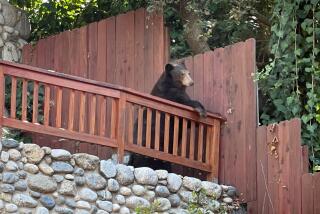New Jersey in Two Camps Over Resurgence in Black Bear Population
- Share via
HARDYSTON, N.J. — The four black bears who visited the Oppenheimer family’s bat mitzvah celebration were not unwelcome.
They took turns emerging from the oak and maple woods behind Victoria’s Mountain Inn. While guests finished dessert and danced inside, the animals ate leftovers from garbage bins behind the white Colonial-style restaurant. For the guests watching from a back window of the dining room, the appearance of the bears was an exciting bonus, said Gary Oppenheimer, a computer consultant -- especially since he and his wife, Marilyn, gave stuffed bears as party favors at the celebration for their daughter, Leah.
Not all people in New Jersey share such enthusiasm at bear sightings. Quite the opposite, in fact. For the first time in 33 years, the state is issuing hunting permits for black bears.
Animal rights groups say the hunt, scheduled for December, won’t solve the problem of the small number of aggressive bears that break into homes and threaten people.
“We have said it is similar to shooting into a crowd to stop crime,” said Nina Austenberg, regional director in New Jersey of the Humane Society of the United States, which urges greater efforts to teach residents how to behave around bears.
Austenberg and other opponents attribute the hunt to economic motives, contending the cash-strapped state’s eventual goal is to sell special bear hunting permits. The permits are now free.
“We simply have too many bears,” countered Scott Ellis, chairman of the New Jersey Fish and Game Council, who plans to go bear hunting on a friend’s farm. “We are simply trying to manage wildlife resources.”
Supporters say at least 26 states, including neighboring New York and Pennsylvania, allow bear hunts -- as does California.
“The controversy of the hunt is a distraction from a natural resource success story,” said Bradley Campbell, New Jersey’s environmental commissioner. “At this point, the population really has exceeded a sustainable level, and we think the hunt is an appropriate management tool.”
Underscoring the emotion, more than 200 pickets protested this month outside the official residence of Gov. James E. McGreevey. They carried signs urging “Don’t Kill the Bears” and “Stop the Bear Hunt.”
The demonstrators in Princeton, N.J., accused McGreevey of flip-flopping on the bear issue -- and collected a pile of rubber “flip-flop” shoes to be sent to the governor’s office in Trenton, the state capital.
In 2000, McGreevey had urged then-Gov. Christie Whitman to halt a hunt. She eventually stopped it.
“We have a very different set of circumstances than we did three years ago,” said Micah Rasmussen, McGreevey’s press secretary. He said the number of incidents in which bears have damaged property, had near run-ins with people and been seen in populated areas “have just exploded.”
“We have a much larger bear population, and, unfortunately, the threat to public safety is real and cannot be ignored,” he added. “The governor would love to not have the bear hunt go forward. Right now, it is the only effective way to control the population.”
Estimates of the number of black bears vary widely from 1,350 to 3,200. Last year, 35 bears deemed to be an immediate threat to life and property were killed. So far this year, 16 have been.
Authorities, hoping to reduce the number of bears by 500, have set a ceiling of 10,000 hunting permits. So far, more than 3,600 applications have been submitted.
Some residents in areas where most black bears are found say they are more afraid of an invasion of hunters than they are of the bears, which many regard with familiarity and affection.
“How many feet are they going to be from my buildings? And then there’s homes on either side of these woods,” said George Amoratis, who with his wife owns Victoria’s Mountain Inn.
“You are also getting people throughout the state who do not know these areas and will make believe they are on safari,” he said. “They are going to go into neighborhoods that are basically residential and claim they are tracking a bear.”
Victoria Amoratis said the family was considering leaving during the bear-hunting season, which will be Dec. 8-13.
Black bears are usually shy around people -- less fierce and usually smaller than their cousins the grizzlies -- but nevertheless can cause problems. Living around them requires prudent behavior on the part of humans, state officials say.
Garbage should be stored in secure areas in airtight containers, which should be washed with a disinfectant once a week.
Dogs and cats should be fed outdoors only during the daytime; bird feeders should be hung at least eight feet off the ground and taken indoors overnight.
Above all, people are warned to never give food to a bear.
In Hardyston, people bang pots and pans to scare away bears. Sometimes, when the animals won’t budge, police are called. The officers turn on their patrol car’s lights and siren.
It usually does the trick.
“We have had a bear in our garage. We called the police and got it out with noise. Our children go to the bus stop with whistles.... Women walk around with air horns just to scare off the bears,” said Victoria Amoratis. “We all enjoy the bears, but we happen to live right in the middle of them.”
More to Read
Sign up for Essential California
The most important California stories and recommendations in your inbox every morning.
You may occasionally receive promotional content from the Los Angeles Times.













